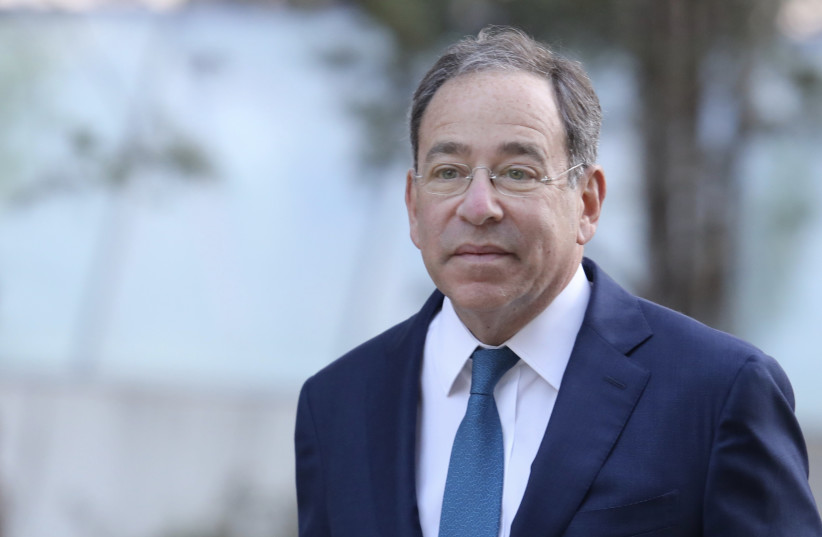US Ambassador Thomas Nides said in a remote lecture to Americans for Peace Now on Tuesday that he was “infuriated” by settlement growth.
“I’m a bit of a nag on this, including the idea of settlement growth, which infuriates me when they do things that just infuriate the situation in east Jerusalem and the West Bank,” he said early on in his remarks to an organization for whom being anti-settlement is what they are all about, their raison d’être.
Nides told his audience what they wanted to hear.
This is not to say that he does not believe it. He obviously does, as he further made clear.

“We can’t do stupid things that impede us for a two-state solution,” he continued. “What I mean is that we can’t have Israelis doing settlement growth in east Jerusalem or the West Bank.”
To his credit, Nides acknowledged that the Palestinians are not without fault.
“By the way, the Palestinians are not perfect, either,” he said. “I want to be clear here.”
Referring to stipends the Palestinian Authority pays the families of terrorists either killed or sitting in jail, a program popularly known as “pay-for-slay,” Nides said, “These martyr payments, you know we can debate and talk about it, have caused an enormous amount of problems. And I’m working with [Defense] Minister [Benny] Gantz and the prime minister and the Palestinians to figure out how to stop it, because it gives the haters – and there are haters – who say: ‘We can’t do this because they are paying for people to kill Jews.’ Again, it’s more complicated than that. I just want to make clear that not everyone is perfect.”
So there you have it. Adding 100 new units in Efrat, or building housing in the Jerusalem neighborhood of Ramat Shlomo that sits beyond the 1967 lines “infuriates” Nides, while a program that incentivizes terrorists by paying their families if they are killed in action or arrested is problematic because people use it as a debating point against rapidly moving toward a two-state solution.
All settlement growth is categorically bad and infuriating, while the “martyr payments” are “complicated” and something “we can debate and talk about.”
In this clumsy construction, rewarding the families of terrorists by paying them is not just plain wrong and immoral, but rather is bad because it serves as an excuse for the “haters” – whoever they are in Nides eyes – to argue against running ahead and making concessions to the Palestinians.
Nides has things backward. Settlement construction is something that can be debated, talked about, and discussed, while rewarding the families of terrorists is what is “infuriating.”
Nides began his remarks to the AFPN by telling a little about himself.
“I’m a Jewish kid who grew up in Minnesota,” he said, adding that he is a Reform Jew who always felt very deeply and strongly about being Jewish. No doubt he does.
He also said he has no ideology. But that seems to be a little less precise. He does have an ideology – it is an anti-settlement ideology, which, by the way, is the ideology of the organization he addressed. It is also an ideology that he exhibits by demonstratively refusing to visit any Jewish community beyond the Green Line.
For instance, were Supreme Court Justice Noam Solberg to invite him for a Shabbat dinner where he lives in Alon Shvut, Nides would have to decline, because he is ideologically opposed to the settlements, and – as his words on Tuesday suggested – opposed to any and all settlement growth, anywhere.
While all this is very much the ambassador’s prerogative, the question is whether it is a wise policy. All US administrations going back to Lyndon Johnson in 1967 opposed the settlements to one degree or another, but it was the Obama administration – and then-secretary of state John Kerry – who took that opposition to another level altogether and turned into a matter of orthodoxy. Under the Obama administration, the idea that the settlements were the root of the Mideast’s problem, the core of the Israeli-Arab conflict, became almost axiomatic.
For the Obama administration, it was all about the settlements, almost an obsession. Just remove the settlements, or stop settlement growth, and the path to peace and a two-state solution would be magically paved.
What made Obama administration officials who adhered to this orthodoxy seem like true believers was that they held onto this belief even after it was proven, via the withdrawal from Gaza in 2005, to be a bogus assumption. Israel uprooted all its settlements before withdrawing totally from the Gaza Strip, but the result was anything but peace.
Do settlements complicate matters? Yes. But are they preventing a two-state solution? Hardly. What is preventing a two-state solution is terrorism, because as long as terrorism rages – and the “martyr payments” that Nides discussed ensures that terrorism will continue to rage – Israelis will never be willing to make any of the concession that Nides would like to see them make for a two-state solution.
While settlement construction has – as Nides put it referring to pay-for-slay – caused “an enormous amount of problems,” it is terrorism, and the incitement to and incentivizing of terrorism, that he should be infuriated about. Because that is what has consistently derailed any Israeli-Palestinian peace process.
